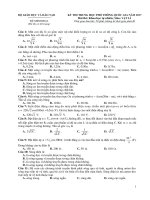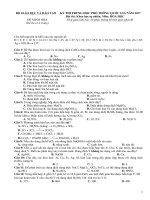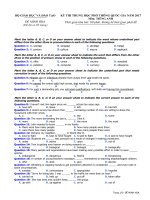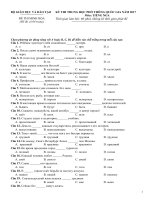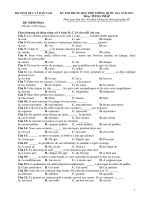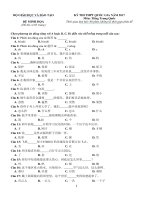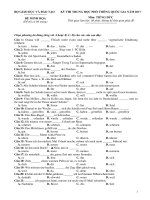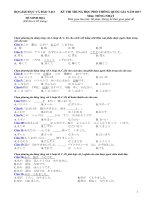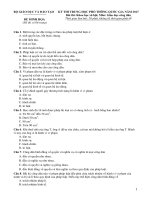- Trang chủ >>
- Đề thi >>
- Đề thi lớp 12
Đề vip 10 phát triển Đề minh họa tham khảo bgd môn anh năm 2024 ( mc3 )
Bạn đang xem bản rút gọn của tài liệu. Xem và tải ngay bản đầy đủ của tài liệu tại đây (132.31 KB, 5 trang )
<span class="text_page_counter">Trang 1</span><div class="page_container" data-page="1">
<b>ĐỀ THAM KHẢO THEOĐỀ MINH HỌA BGD NĂM 2024</b>
<b>ĐỀ 10 – MC3</b>
<i>(Đề thi có … trang)</i>
<b>KỲ THI TỐT NGHIỆP TRUNG HỌC PHỔ THƠNG 2024Mơn thi: TIẾNG ANH</b>
<i>Thời gian làm bài: … phút, không kể thời gian phát đề.</i>
<i><b>Mark the letter A, B, C, or D on your answer sheet to indicate the sentence that best completes each of thefollowing exchanges.</b></i>
<b>Question 1: Mason invited his friend , Duong, to have dinner out that night and Duong accepted.</b>
‒ Mason : “ Shall we eat out tonight ? “ ‒ Duong : “_____________________”
<b>A. That’s acceptable. B.That’s a great idea. C. You are welcome. D. It’s kind of you to invite.Question 2: Van is going shopping with her sister .</b>
‒ Van : “ What do you think of fashion ? “ ‒ Hanh: “_______________________ “
<b>A. I am crazy about it. B. Of course the fashion show is excellent.</b>
<b>C. Well, it’s beyond my expectation. D. It’s none of my business.</b>
<i><b>Mark the letter A, B, C, or D on your answer sheet to indicate the correct answer to each of the followingquestions.</b></i>
<b>Question 3: The use of details is _________ method of developing a controlling idea, and almost all students</b>
employ this method.
<b>A. less common B. more common C. most common D. the most common Question 4: Opera singer Maria Calass was known for her _________, powerful voice.</b>
<b>Question 5: Psychological violence is so dangerous, __________ to unexpected consequences.</b>
<b>Question 6: There is great disparity between the rich and _________ poor in India.</b>
<b>Question7: You will have to _________ your holiday next week if you are too ill to travel.</b>
<b>Question 8: The farmer’s crops ___________ seriously by floods last year .</b>
<b>Question 9: David regrets _________ love to her sooner because they are no longer together.</b>
<b>Question 10: People don’t like the way she shows off,_______?</b>
<b>Question 11: His ________ of the school regulations really can’t be ignored any longer.</b>
<b>A. unfamiliarity B. carelessness C. disregard D. inattentionQuestion 12: When the baby woke up and cried, they _________ dinner in the kitchen.</b>
<b>Question 13: The music show last night left a deep __________ on all audience.</b>
<b>Question 14: I will tell you the truth, ___________ .</b>
<b>A. until he reveal his secret to me B. When he revealed his secret to meC. as soon as he reveals his secret to me D. After he had revealed his secret to me </b>
<b>Question 15: Most young people want to _________ an independent life without being influenced by anyone.</b>
<b>Question 16: It was difficult_________me to guess what his reaction to the news would be. </b>
<b>Question 17: Making friends at the new job was easy as _________ for him. </b>
<i><b> Mark the letter A, B, C, or D on your answer sheet to indicate the word whose underlined part differs from theother three in pronunciation in each of the following questions.</b></i>
<i><b>Mark the letter A, B, C, or D on your answer sheet to indicate the word that differs from the other three in theposition of stress in each of the following questions.</b></i>
</div><span class="text_page_counter">Trang 2</span><div class="page_container" data-page="2"><b>Question 20: A. novelB. villageC. surpriseD. physicsQuestion 21: A. interviewB. concentrateC. comfortable D. technology</b>
<i><b>Mark the letter A, B, C, or D on your answer sheet to indicate the word CLOSEST in meaning to theunderlined word in each of the following questions.</b></i>
<b>Question 22: I didn’t think her comments were appropriate at that time.</b>
<b>Question 23: He wasn't able to manage with the stresses and strains of the job.</b>
<i><b>Mark the letter A, B, C, or D on your answer sheet to indicate the word(s) OPPOSITE in meaning to theunderlined word(s) in each of the following questions.</b></i>
<b>Question 24: The International Organizations are going to work in a temporary way in that country.</b>
<b>Question 25: I’m sure they wanted us to stay for dinner. They received us with open arms.</b>
<i><b>Read the following passage and mark the letter A, B, C, or D on your answer sheet to indicate the correct wordor phrase that best fits each of the numbered blanks from 26 to 30.</b></i>
Urban development is having a direct impact on the weather in (26) _________ cities worldwide. It has beennoticed that the difference in temperature is usually greater at night and the phenomenon occurs in both winnerand summer. Experts agree that this is due to urban development, when open green spaces are replaced withasphalt roads and tall brick or concrete buildings. These materials retain heat generated by the Sun and release itthrough the night. In Atlanta, in the US, this has even led to thunderstorms (27) _________occur in the morningrather than, as is more common, in the afternoon.
Large cities around the world are adopting strategies to combat this issue (28) _________ it is not uncommon tofind plants growing on top of roofs or down the walls or large buildings. In Singapore, the government has (29)_________ to transform it into a “city within a garden” and, in 2006, they held an international competition callingfor entries to develop a master plan to help bring this about. One outcome was the creation of 18 “Supertrees” –metal constructions resembling very tall trees. Each one is a vertical freestanding garden and is (30) _________ toexotic plants and ferns. They also contain solar panels used to light the trees at night and also containers to collectrainwater, making them truly self‒ sufficient.
(Adapted from “The Official Cambridge Guide to IELTS” by Pauline Cullen, Amanda French and VanessaJakeman)
<b>Question 29: A. committed B. pledged C. confessed D. required</b>
<i><b>Read the following passage and mark the letter A, B, C, or D on your answer sheet to indicate the correctanswer to each of the questions from 31 to 35.</b></i>
A letter of application is a sales letter in which you are both salesperson and product, for the purpose of anapplication is to attract an employer’s attention and persuade him or her to grant you an interview. To do this, theletter presents what you can offer the employer, rather than what you want from the job.
Like a resume, the letter of application is a sample of your work and an opportunity to demonstrate your skills
<b>and personality. If it is written with flair and understanding and prepared with professional care, it is likely to be</b>
very effective. While the resume must be factual, objective, and brief, the letter is your chance to interpret and
<b>expand. It should state explicitly how your background relates to the specific job, and it should emphasise your</b>
strongest and most relevant characteristics. The letter should demonstrate that you know both yourself and thecompany.
The letter of application must communicate your ambition and enthusiasm. Yet it must be modest. It shouldbe neither aggressive nor compliant: neither pat yourself on the back nor ask for sympathy. It should never expressdissatisfaction with the present or former job or employer. And you should avoid discussing your reasons forleaving your last job.
Finally, it is best that you not broach the subject on salary. Indeed, even if a job advertisement requires thatyou mention your salary requirements, it is advisable simply to call them “negotiable.” However, when you go onan interview, you should be prepared to mention a salary range. For this reason, you should investigate both your
</div><span class="text_page_counter">Trang 3</span><div class="page_container" data-page="3">field and, if possible, the particular company. You don’t want to ask for less than you deserve or more than isreasonable.
<i><b> (Adapted from “Select Readings – Intermediate” by Linda Lee and Erik Gundersen)</b></i>
<b>Question 31. The passage is mainly about_______?A. Things to avoid during a job interview.B. Advice on how to find a good job.</b>
<b>C. Tips for writing an effective letter of application.</b>
<b>D. Differences between a resume and a letter of application.</b>
<b>Question 32: According to paragraph 1, in a letter of application, the applicant tries to ___________. A. advertise a product to attract more customers.</b>
<b>B. present what he/she wants from the job.</b>
<b>C. persuade the employer to grant him/her an interview.D. get further information about the company.</b>
<b>Question 33: The word “it” in paragraph 2 refers to ______________.</b>
<b>A. the resume. B. the letter of application. C. an opportunity. D. your work.Question 34: The word “explicitly” in paragraph 2 is closest in meaning to _______________.</b>
<b> Question 35: According to the passage, all of the following are true about a letter of application, EXCEPT</b>
<b>A. It should be written very briefly, but in a formal style.</b>
<b>B. It should state explicitly how your background relates to the specific job.C. It should expand upon the information contained in the applicant’s resume. </b>
<b>D. It should never express the applicant’s dissatisfaction with his/her former employer.</b>
<i><b>Read the following passage and mark the letter A, B, C, or D on your answer sheet to indicate the correctanswer to each of the questions from 36 to 42.</b></i>
While watching sports on TV, the chances are children will see professional players cheating, havingtantrums, fighting, or abusing officials. In addition, it's highly likely that children will be aware of well‒knowncases of sportspeople being caught using drugs to improve their performance. The danger of all this is that it couldgive children the idea that winning is all that counts and you should win at all costs. Good behaviour and fair playaren't the message that comes across. Instead, it looks as if cheating and bad behaviour are reasonable ways of
<b>getting what you want. This message is further bolstered by the fact that some of these sportspeople acquire</b>
enormous fame and wealth, making it seem they are being handsomely rewarded either despite or because of theirbad behaviour.
What can parents do about this? They can regard sport on television as an opportunity to discuss attitudes andbehaviour with their children. When watching sports together, if parents see a player swearing at the referee, theycan get the child's opinion on that behaviour and discuss whether a player's skill is more important than theirbehaviour. Ask what the child thinks the player's contribution to the team is. Point out that no player can win ateam game on their own, so it's important for members to work well together.
Another thing to focus on is what the commentators say. Do they frown on bad behaviour from players, thinkit's amusing or even consider it's a good thing? What about the officials? If they let players get away with a clearfoul, parents can discuss with children whether this is right and what effect it has on the game. Look too at thereactions of coaches and managers. Do they accept losing with good grace or scowl and show a bad attitude?Parents can use this to talk about attitudes to winning and losing and to remind children that both are part of sport.
However, what children learn from watching sports is by no means all negative and parents should make sure
<b>they accentuate too. They should emphasise to children the high reputation that well‒behaved players have, notjust with their teammates but also with spectators and the media. They can focus on the contribution made by such</b>
players during a game, discussing how valuable they are in the team. In the interviews after a game, point out to achild that the well‒behaved sportspeople don't gloat when they win or sulk when they lose. And parents can stresshow well these people conduct themselves in their personal lives and the good work they do for others when notplaying. In other words, parents should get their children to focus on the positive role models, rather than theantics of the badly behaved but often more publicised players.
<i>(Adapted from "New English File ‒ Advanced" by Will Maddox)</i>
<b>Question 36: Which of the following can be the best title of the passage? A. The Importance Of Team Spirit In Sport</b>
<b>B. The Influence Of Model Sportspeople On ChildrenC. Moral Lessons For Children From Watching SportsD. Different Attitudes Toward Bad Behaviour In Sport</b>
</div><span class="text_page_counter">Trang 4</span><div class="page_container" data-page="4"><b>Question 37: The word "bolstered" in paragraph 1 is closest in meaning to ______.</b>
<b>Question 38: According to paragraph 1, misconduct exhibited by players may lead children to think that ______.A. it is an acceptable way to win the game </b>
<b>B. it is necessary in almost any gameC. it brings about undesirable results D. it is disadvantageous to all concerned</b>
<b>Question 39: The word "accentuate" in paragraph 4 can be best replaced by ______. </b>
<b>Question 40: The word "They" in paragraph 4 refers to ______.</b>
<b>Question 41: Which of the following about sport is NOT TRUE in the passage?</b>
<b>A. Misconduct from sportspeople may go unpunished despite the presence of officials.</b>
<b>B. A well‒behaved player enjoys a good reputation among his teammates, spectators and the media. C. Reactions of coaches and managers when their teams lose a game may be of educational value.D. Many sportspeople help others so as to project good images of themselves.</b>
<b>Question 42: Which of the following can be inferred from the passage?</b>
<b>A. The media tend to turn the spotlight more on sportspeople's wrongdoings than on their good deeds. B. The well‒behaved players in a game invariably display desirable conducts when not playing.C. Players with good attitudes make a greater contribution to their teams' budgets than others.D. Well‒mannered players sometimes display strong emotions after winning or losing a game.</b>
<i><b>Mark the letter A, B, C, or D on your answer sheet to indicate the sentence that best combines each pair ofsentences in the following questions.</b></i>
<b>Question 43: He didn’t pick her up from school on time. She was angry with him.A. If he picked her up from school on time, she would be angry with him.</b>
<b>B. If he had picked her up from school on time, she wouldn’t have been angry with him.C. If he had picked her up from school on time, she wouldn’t be angry with him.</b>
<b>D. If he hadn’t picked her up from school on time, she wouldn’t be angry with him.Question 44: We arrived at the cinema. Then we realized our tickets were still at home.</b>
<b>A. No sooner had we realized that our tickets were still at home than we arrived at the cinema. B. Not until we arrived at the cinema that we realized that our tickets were still at home.C. Only after we had arrived at the cinema did we realize that our tickets were at home.D. Hardly had we arrived at the cinema than we realized that our tickets were still at home.</b>
<b>Mark the letter A, B, C, or D on your answer sheet to indicate the underlined part that needs correction ineach of the following questions.</b>
<b>Question 45: All students in our school are always required to wash his hand before having lunch every day. </b>
<b>Question 46: The treatment for people addictive to tranquillizers includes training in stress management and</b>
relaxation techniques.
<b>Question 47: He didn’t even close the door before he goes out yesterday. </b>
<b>Mark the letter A, B, C, or D on your answer sheet to indicate the sentence that is closest in meaning to eachof the following questions.</b>
<b>Question 48: We are not permitted to enter the factory after 5 p.m without authorization. A. We won't enter the factory after 5 p.m without authorization.</b>
<b>B. We needn't enter the factory after 5 p.m without authorization.C. Visitors wouldn't enter the factory after 5 p.m without authorization.D. Visitors mustn't enter the factory after 5 p.m without authorization.</b>
<i><b>Question 49: The last time I heard this song was 10 years ago. </b></i>
<b>A. It has been 10 years when I have heard this song.B. I didn’t hear this song since 10 years . C. I haven’t heard this song for 10 years.D. It is 10 years when I have heard this song.Question 50: He told me: “ you used to be a very special person in my heart “. </b>
<b>A. He told me that I had used to be a very special person in his heart.B. He told me that you had used to be a very special person in his heart.C. He told me that I used to be a very special person in his heart.</b>
<b>D. He told me that you used to be a very special person in his heart.</b>
</div>
